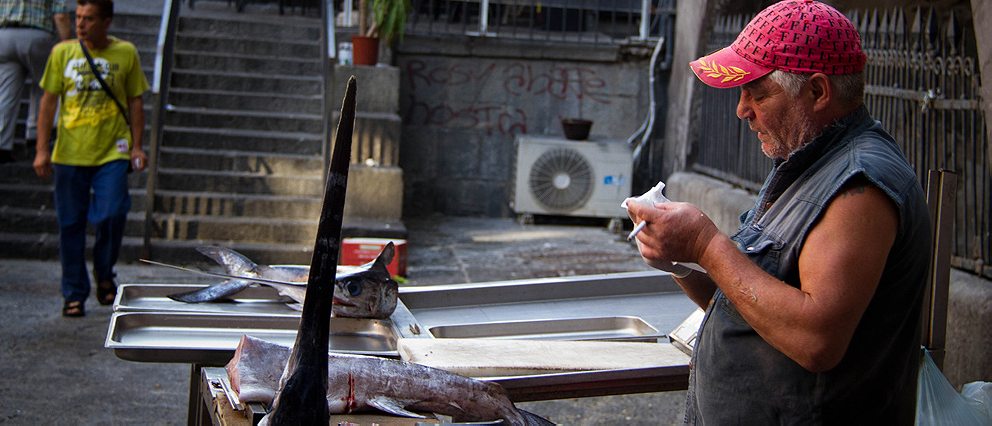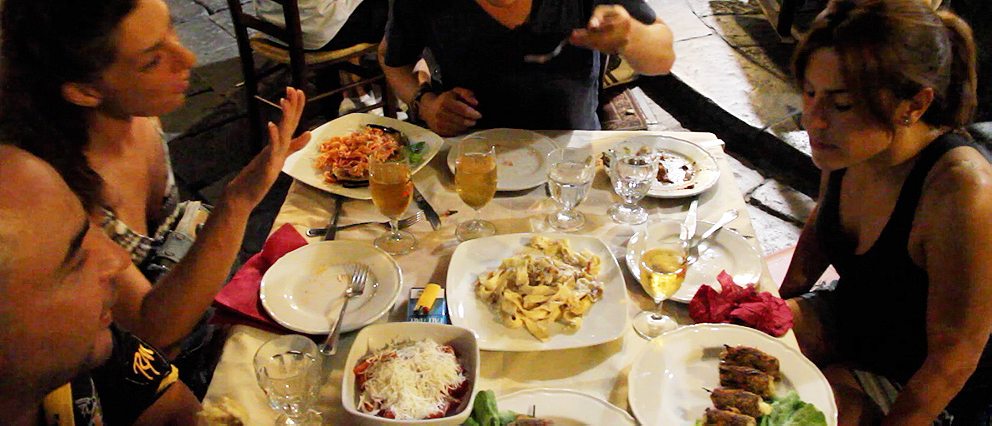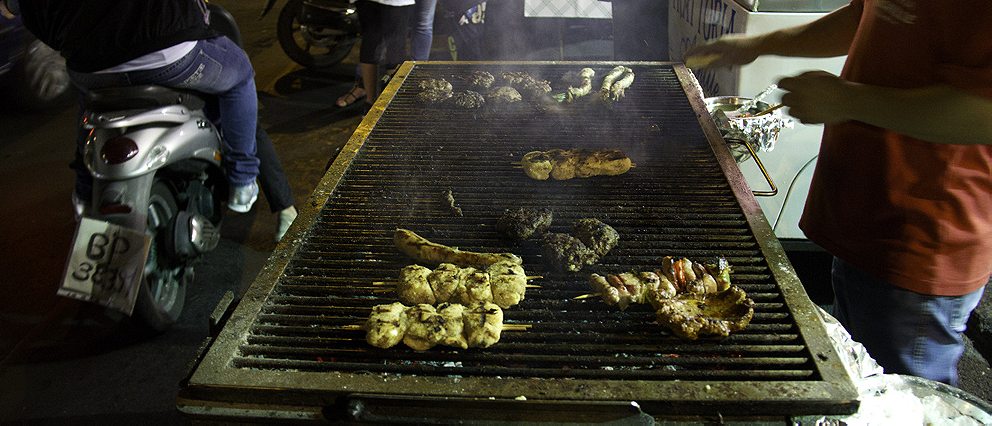A crumbling, colonnaded mashup of Havana, Rome and Tunis, Catania offers a glimpse of real—sometimes too real—Sicilian city life.
La Passeggiata
It might as well be the afternoon of November 4th, 1928, the last time Mount Etna dug her molten claws into this town. At 4 pm in Catania, nothing moves. Not the shop owners, who drop the metal curtains and wander home to their wives. Not the granita kid, who no longer has any customers to buy his icy cups of pistachio and lemon; his tiny cart in Piazza Stesicoro must feel like a death foretold. Not the polizia, who have taken a break from smoking cigarettes and smirking on the sidewalk to retreat inside the station, where a radio and a fan awaits them. Somewhere on the sands of the city, pinched between the train tracks and the Ionian Sea, Italians from the mainland move once every half hour, to turn over.
By 7 pm, the heat has broken. A continuous mass of pedestrians shut down the streets snaking out from Piazza del Duomo. Couples hold hands and shake off their siestas; kids kick soccer balls around the slow march of their grandparents.
By 8 pm, the weddings are letting out. Newlyweds fight for photo opportunities in front of Catania’s regal duomo. A girl with a dozen roses and a sparkly crown stretches out across the steps at the base of the elephant statute, the ruffles of her blue dress filling out three flights of stairs, as two photographers try to capture this, her 18th birthday, for the ages.
By 9 pm, everyone has nibbled on something. Aperitivo hour may have started in the north, but it’s no less important down her on the island, especially after the afternoon exile of a Sicilian summer. A beer or a spritz will get you a round of stuzzichini, salty bar snacks to ward off the hunger—and perhaps encourage a second round. But no one orders a second round. Reservations must be honored or friends are waiting or Mom left the pasta sauce simmering on the stovetop. But by the time 10 pm strikes, it is clear that while the people of Catania may have ceded the day, they have taken back the night.

Fishmonger Bazaar
The noise begins on the edge of the market: deep belly grunts and curses few but a handful of people on this planet can understand. The men are carrying five giant buckets of fish on top of a wooden pallet, and soon the entire market knows it. As they make their way through the snaking stalls, past the mountains of mussels and hills of purple urchins, through the hall of swordfish where 80-kilo carcasses are hacked into steaks with giant cleavers, past the boy with clams the size of thumbnails and the old man with live sea snails and bundles of dried oregano; as they make their way grunting and cursing through the market they slowly begin picking off customers from the other vendors, so that when they arrive at their final destination, a wet corner at the base of the stairs leading up to the duomo, 20 men are waiting for their catch. Sicilian marketing.
Despite the grunting and cursing and wild gesticulating, there appears to be some sort of order, as one by one, old men walk away with plastic bags filled with sardines. (You won’t find women in Catania’s central fish market, not selling and not even buying; like futbol and cat-calling, the buying and selling of fish is a men’s sport here.) A team of two go about “cleaning” the tiny fish, which in this case means snapping off their heads and yanking out their spines in a single motion. They do this, of course, with cigarettes dangling from their lips, because the market’s only rule is that all fishmongers must smoke as they handle their catch. By the time they finish off the first few kilos, their hands are stained a dozen shades of red. The smell of fish oil will never leave them.

The Concert
The Napolitana is arguing passionately about whether Napolitanos or Sicilians are the most passionate people in all of Italy. It’s a fact-free argument, so it is hard to pick a winner. But it does become clear, after the squall of gesturing that Italians are known for has blown over, that the Napolitana is definitely the more passionate about the topic of being passionate, so you suppose that counts as winning.
But even looking for a winner is an impossibly American way of envisioning what is happening at our table at an outdoor restaurant in Catania old town. Because this argument, like the thousands of other heated exchanges that fill the bars and bistros of this town, is not about any result in particular. It is about the pure elan of opinion.
You try to spark some sort of similar argument—Sabrina says she won’t eat the tomatoes without oil, so you try to argue back that only a crazy person, or someone from Asti like her, would think of such a thing: drowning a perfect, innocent red tomato in oil. But your argument lacks flair, conviction, volume, pacing: everything that makes an Italian discussion late into the night a concert as much as a disagreement.
You accept this, happy to be defeated, pour a bit of oil on your tomatoes, and resume watching the show.

The Culture
His name is not remembered here—was it Pietro?—but he is thought of fondly. Because a waiter like that, who not only serves, but defends, is rare indeed.
The long, scythe-shaped road called Via del Plebiscito leads up the hill from the church of the Cappuchini and, there, on a curve in its middle, is a two-block open-air street food market that at one in the morning on a Saturday night is full of people who have been drinking all night, including a few who drive by slowly singing out of the windows of Fiats or those who come to eat loudly, with the urgency of drunks.
But those are not the people you need to worry about. Instead, you should be concerned that table of older men, staring dourly at the carnival, receiving the occasional visitor and drinking only espresso. That’s because, when you arrived with a camera and two foreigners and one Sicilian, someone came hustling out from the kitchen of this place and said, there are people here who don’t want their picture taken. A good deal of negotiating took place, which left your one Sicilian a little flustered—“this is what I don’t like about Sicily. I won’t say the word, but you know what I’m talking about. There is no law here, no law.”
The word, of course, is mafia, still only spoken when one can’t be overheard here.
Why negotiate to stay at a street stand with plastic chairs and plastic tablecloth and sit next to glum Mafiosi who do not want you there? Because the stand is packed, the grill is firing, and the meat is ready. You are going to eat the one thing that Via del Plebiscito is famous for: horse meat.
But first, the waiter comes and winks at you conspiratorially. They are all crazy, the wink says, I am happy to have you here.
Before long, all ominous thoughts pass as he brings plate after plate from the grill: long spring onions wrapped in pancetta, something that rather crudely would be called horse burger, and the best of the lot, colt steak, tender and marinated like strip steak.
Italians eat more horse—a kilo a year per person—than anyone in Europe, anyone outside of the horse tribes of the Steppe. Around 213,000 horses are killed for meat, with many more brought in from Eastern Europe. Depending on where you live, the meat is made into pastissada stew, or bresaola or just grilled late at night in Catania.
There have been movements, including as recent as two years ago, to outlaw the sale of horse meat in Italy, but the bill died in parliament. Italians would not have stood for it.
We can’t pretend to know the ethics of all this: is a cow not as deserving of love and compassion as a horse? But the culture is the culture, and the food was good, and the night passed uneventfully, the old men still as statues, and Pietro, or Gianni, or whatever the waiter’s name was, wishing you a good night as you head back down the hill.